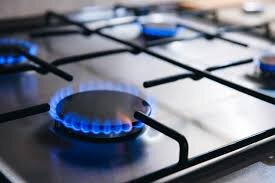What should your gas cooktop be made of? Stainless steel? Glass? Each has pros and cons! This guide will break it down simply so you can pick the best material for a gas cooktop in 2024. We’ll cover how easy they are to clean, how hot they get, and how they look in your kitchen!
Table of Contents
Choosing the Right Cooktop Material: Stainless Steel vs. Glass
When selecting a gas cooktop material, two popular choices are stainless steel and tempered glass. Each offers unique benefits and fits different kitchen styles and preferences. Here’s a simple breakdown to help you make the best choice for your kitchen:
- Stainless Steel
- Durability: Resistant to corrosion and scratches, ideal for long-term heavy use.
- Heat Resistance: Can handle high heat without warping or discoloration.
- Ease of Cleaning: Often easier to clean, with spills and stains wiping off quickly.
- Cost: Generally more affordable than glass options.
- Appearance: Adds a classic, professional look to your kitchen but may show fingerprints.
- Tempered Glass
- Modern Look: Sleek, smooth surface adds a contemporary touch to any kitchen.
- Heat Control: Provides easy visibility of flames, allowing for precise heat adjustments.
- Cleaning: The smooth surface is easy to wipe, though it may require extra care to avoid scratches or cracks.
- Safety: Tempered for high heat tolerance but can be more susceptible to breakage.
- Cost: Usually a bit more expensive than stainless steel due to its aesthetic appeal.
What are the top 6 features of the best quality gas cooktop?
Determining the “best” gas cooktop depends on various factors, including budget, cooking needs, and personal preference. However, some features to look for in a high-quality gas cooktop include:
High BTU Output: Higher BTUs (British Thermal Units) provide faster, more powerful heat, making cooking quicker and more efficient.
Burner Arrangement: Opt for a model with a variety of burner sizes and placements, including special burners like simmer or high-heat options.

Quality Materials: Stainless steel or high-grade tempered glass ensures longevity and easier maintenance.
User-Friendly Controls: Precise knobs or touch controls simplify cooking adjustments, helping you achieve the desired temperature quickly.
Safety Features: Look for flame failure protection, automatic re-ignition, and child locks to enhance kitchen safety.

Brand & Warranty: Choose reputable brands known for quality customer support, such as Thermador, Wolf, GE, Bosch, and KitchenAid.
Some of the popular brands that are known for their quality gas cooktops include Thermador, Wolf, GE, Bosch and KitchenAid. Ultimately, your best gas cooktop will depend on your specific cooking needs and preferences.
What Is The Best Material For A Gas Cooktop?
The best surface for a gas cooktop often depends on personal preference, cooking habits, and kitchen aesthetics. Here are some standard options:
- Stainless Steel: Stainless steel is a popular choice for gas cooktops due to its durability, resistance to heat and stains, and sleek appearance. It is also relatively easy to clean.

- Tempered Glass: Glass cooktops offer the kitchen a modern and elegant look. Tempered glass is durable and can withstand high temperatures but may require extra care to avoid scratches or cracks.

- Cast Iron Grates: Many gas cooktops have cast iron grates, which provide stability and support to the cookware. Cast iron grates are durable and often coated with enamel for easy cleaning.
- Continuous grates: Some gas cooktops have continuous grates that cover the entire surface, allowing pots and pans to slide easily over the burners. This design can be convenient for moving cookware around while cooking.
- Ceramic Coatings: Some gas cooktops have ceramic-coated surfaces that are easy to clean and resist stains and scratches. However, these surfaces may not be as durable as stainless steel or cast iron.
Ultimately, the best surface for a gas cooktop depends on factors such as durability, ease of cleaning, aesthetic preferences, and budget. It is essential to consider these factors and choose a surface that suits your needs and complements your kitchen design.
Top 8 Best Brand Of Gas Cooktops?
Determining the best brand of gas cooktops depends on personal preference, budget, and desired features. Some of the brands that are known for their high-quality gas cooktops include:
- Thermador: Thermador is known for its high-performance, premium-quality gas cooktops, which feature potent burners and sleek designs.
- Wolf: Wolf offers professional-grade gas cooktops known for their precise temperature control, durability, and advanced features designed for home cooks and chefs.
- GE: GE manufactures a range of gas cooktops, including budget-friendly options and premium models with advanced features such as precision and rapid boiling.
- Bosch: Bosch gas cooktops are acclaimed for their German engineering, sleek design, and reliable performance, offering features like continuous grates and easy-to-clean surfaces.
- KitchenAid: KitchenAid gas cooktops are known for their combination of style and functionality. These include potent burners, durable construction, and user-friendly controls.
- JennAir: JennAir offers high-end gas cooktops with features like brass burners, electronic ignition, and premium finishes, catering to those seeking luxury and performance.
- Miele: Miele gas cooktops gain recognition for their precision, durability, and elegant design, boasting features such as sealed burners and easy-to-clean grates.
- Samsung: Samsung produces gas cooktops with innovative designs and advanced features such as Wi-Fi connectivity and virtual flame technology for a realistic cooking experience.
Ultimately, the best brand of gas cooktops for you will depend on your specific needs, preferences, and budget. Before deciding, it’s essential to research different brands, read reviews, and consider factors such as cooking performance, durability, and features.
Is Stainless Steel Suitable For Cooktops?
Yes! Stainless steel is durable, heat-resistant, stain-proof, and easy to maintain, making it a practical choice for high-use kitchens. Its modern appearance complements various kitchen styles, and its long lifespan makes it a wise investment.
Why Choose a Gas Cooktop?
Gas cooktops offer advantages such as instant heat control, even heating, and versatility in cookware compatibility. They remain usable during power outages, provide a visual flame for better heat monitoring, and generally use energy more efficiently than some electric options.
Why Is A Gas Cooktop Better?
A gas cooktop offers several advantages that make it the preferred choice for many cooks:
- Instant Heat Control: Gas cooktops provide instant heat adjustment, allowing precise control over cooking temperature. Cooks can quickly raise or lower the heat as needed, making gas cooktops ideal for tasks that require precise temperature control, such as simmering or roasting.
- Even heating: Gas burners distribute heat evenly across the bottom of the cookware, resulting in more consistent cooking results than some electric cooktops with hot spots or uneven heat. can
- Versatility: Gas cooktops are compatible with various cookware materials, including stainless steel, cast iron, and copper. They also support cooking techniques such as stirring, searing, and boiling.
- Visual Cue: The visible flame on a gas burner provides a visual cue, making it easy for cooks to gauge the intensity of heat and adjust accordingly. This feature especially helps novice cooks or those transitioning from electric cooktops.
- Reliability: Gas cooktops can be used even during power outages, making them a reliable option for cooking even when electricity is unavailable.
- Energy efficiency: Gas cooktops use natural gas or propane, and they are often more energy efficient than electric cooktops, especially for high-heat cooking methods like boiling water.
- Easy installation and maintenance: Gas cooktops are generally easier to install and less expensive than other cooktops, such as induction cooktops. They also have fewer wearable components, simplifying maintenance and repair tasks.
Gas cooktops’ quick heat control, even heating, versatility, and reliability make them a preferred choice for many home cooks and professional chefs.
How Do Gas Cooktops Work?
Gas cooktops burn natural gas or propane to create a flame, which provides the heat needed to cook food. Here is a detailed explanation of how gas cooktops work:
- Gas Supply: Gas cooktops are connected to a gas supply line, natural gas from a municipal supply, or propane from a tank. A gas supply line fuels the cooktop.
- Control Knobs: Each burner on a gas cooktop has a corresponding control knob. When you turn the knob, it opens the gas valve for that burner, allowing gas to flow.
- Ignition System: Modern gas cooktops usually have an electric ignition system. When you turn the control knob, it activates the igniter. The igniter produces a spark that ignites the gas from the burner. Older models may use a pilot light, a small flame that stays lit and ignites the gas when the burner is on.
- Burner: Once burned, the gas passes through a series of small holes or ports in the burner. These ports distribute the gas evenly, creating a controlled flame. The size and intensity of the flame can be adjusted by turning the control knob, which controls the amount of gas flowing into the burner.
- Heat distribution: The flame from the burner heats the vessel placed on the grate above it. Gas burners provide direct heat, allowing for quick temperature adjustments and even heat distribution across the bottom of the cookware.
- Safety features: Many modern gas cooktops have safety features such as flame failure protection, which automatically shuts off the gas supply if the flame goes out. Some models also have an automatic re-ignition system that ignites the burner in case the flame is accidentally extinguished.
In essence, gas cooktops supply gas to the burners, ignite the gas to create a flame, and allow precise control over flame intensity to heat the cookware efficiently. The combination of easy heat adjustment, quick ignition, and even heat distribution make gas cooktops popular with many home cooks and professional chefs.
Top 6 Benefits Of A Gas Cooktop
Here are some of the benefits of a gas cooktop:
- Top 6 Benefits of a Gas Cooktop
- Instant Heating & Cooling: Fast response to heat adjustments.
- Even Heat: Direct flame offers balanced heating across the pan base.
- Temperature Control: Adjust flame for precise cooking needs.
- Durability: Fewer parts make them less likely to malfunction.
- Reliable in Power Outages: Use gas even when electricity fails.
- Visual Feedback: Visible flames help gauge cooking temperature better.
Here are some additional factors to consider:
- Cost: Gas cooktops can be more expensive upfront than electric cooktops. However, natural gas is often cheaper than electricity, so that you may save money on energy bills over time.
- Safety: Gas cooktops require additional safety precautions, such as ensuring proper ventilation and keeping flammable materials away from the burners.
- Aesthetics: Gas cooktops can add a touch of elegance and sophistication to your kitchen. They come in a variety of styles to match your décor.
Gas cooktops offer several benefits for home cooks who value speed, precision, and control. They are durable, can be used during power outages, and may even suit your preferred cooking style. However, they can be more expensive upfront and require additional safety considerations.
What Are The Disadvantages Of Using A Gas Cooktop?
While gas cooktops offer many advantages, there are also some downsides to consider before deciding on your kitchen:
- Installation: Requires professional setup, which can increase initial costs.
- Ventilation: Proper ventilation is essential to manage combustion byproducts.
- Safety: Gas leaks pose risks, so carbon monoxide detectors are recommended.
- Cleaning: Burners and grates can be tricky to clean.
- Environmental Impact: Uses fossil fuels, contributing to emissions.
- Aesthetics: Some may prefer the cleaner look of electric or induction cooktops.
Ultimately, deciding between a gas and electric cooktop depends on your needs and preferences. When choosing, consider factors like cooking style, budget, safety concerns, and aesthetics.
Conclusion
In conclusion, Deciding between stainless steel and tempered glass for your gas cooktop boils down to your priorities. Stainless steel is the budget-friendly champion, offering durability and easy cleaning. Spills and splatters wipe right off, and can withstand high heat without a hitch. On the other hand, tempered glass brings a touch of modern elegance to your kitchen. The smooth surface creates a seamless look; you can easily see the flame for perfect heat control.
Ultimately, the choice is yours! If you prioritize ease of cleaning and affordability, stainless steel is excellent. But if a sleek, modern look and the ability to monitor heat easily are more critical, then tempered glass might be your perfect match. No matter which material you choose, you’ll enjoy the benefits of gas cooking—precise control, even heating, and the ability to cook during a power outage.
FAQs
Which cooktop material is easiest to clean?
Glass is the easiest to clean with a smooth surface, though stainless steel is also manageable with regular maintenance.
Is stainless steel safe for high-heat cooking?
Yes, stainless steel is highly heat-resistant and safe for high-heat cooking, making it a preferred choice for professional kitchens.
Are glass cooktops prone to cracking?
Tempered glass cooktops are designed to be durable but can crack if subjected to rapid temperature changes or heavy impacts.
What material is best for heavy-duty cooking?
Stainless steel is ideal for heavy-duty cooking due to its durability, heat tolerance, and ease of maintenance.
Can porcelain cooktops handle high heat?
Porcelain can handle medium to high heat but may chip or fade with extremely high temperatures over time.




